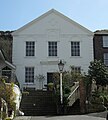
Tenby Lifeboat Station is a lifeboat station in Tenby, Pembrokeshire, Wales that has been situated to the east of the town since 1852, three generations having been built; the original and updates in 1905 and 2005. The station currently houses two lifeboats.
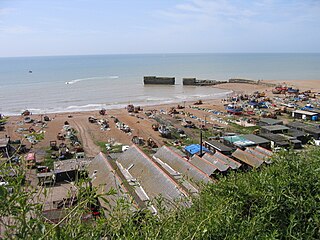
The Stade is a shingle beach in Hastings Old Town, Hastings, East Sussex, England. It has been used for beaching boats for more than a thousand years. It is now home to Europe's largest fleet of beach-launched fishing boats.

Sheringham Lifeboat Station is an RNLI operated lifeboat station located in the town of Sheringham in the English county of Norfolk. Since 1992, the station has been inshore operations only – currently with an Atlantic 85 rigid inflatable – offshore lifeboats are to the east at Cromer and the west at Wells-next-the-sea.

Wells-next-the-Sea Lifeboat Station is located at the end of Beach Road, about 1 mi (1.6 km) north of the town of Wells-next-the-Sea, on the north coast of the English county of Norfolk.
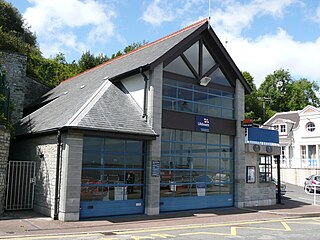
Penarth Lifeboat Station is located on the Esplanade in Penarth, Vale of Glamorgan, Wales.

Barry Dock Lifeboat Station is located at the Pierhead Buildings, at Barry Dock Outer Harbour, near the town of Barry, in the Vale of Glamorgan, Wales.

St Ives Lifeboat Station is the base for Royal National Lifeboat Institution (RNLI) search and rescue operations at St Ives, Cornwall in the United Kingdom. The first lifeboat was built for the town in 1840 and the present boathouse was opened in 1994. It operates a Shannon-class All-weather boat (AWB) and a D-class (IB1) inshore lifeboat (ILB).

Ilfracombe Lifeboat Station is the base for Royal National Lifeboat Institution (RNLI) search and rescue operations at Ilfracombe, Devon, England. The first lifeboat was stationed in the town in 1828 and the present station was opened in 1996. For 29 years a second boat was operated from Morte Bay at Woolacombe.

Minehead Lifeboat Station is the base for Royal National Lifeboat Institution (RNLI) search and rescue operations at Minehead, Somerset in England. The first lifeboat was stationed in the town in 1901 but since 1976 two inshore lifeboats (ILBs) have been operated, a B Class rigid-hulled boat and an inflatable D Class.
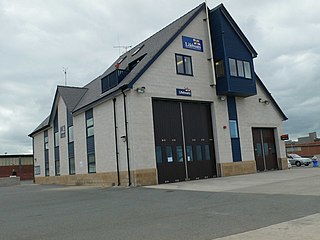
Rhyl Lifeboat Station is operated by the Royal National Lifeboat Institution (RNLI) in the North Wales town of Rhyl. For over 150 years, the Lifeboat Crew in Rhyl have been saving lives at sea. The first lifeboat was stationed in the town in 1852 and the present station was opened in December 2001. The station operates a Shannon-class All-weather lifeboat (ALB), and an D-class (IB1) Inshore lifeboat (ILB).

RNLB William Bennett was the second RNLI lifeboat to be stationed at the English seaside town of Sheringham in the county of Norfolk. She served the North Norfolk coast from 1886 until 1904. Her time at Sheringham was notorious for the difficulties she had during launch and retrieval to the lifeboat station which at this time was awkwardly placed in the centre of town.

Henry Ramey Upcher was the second private lifeboat to be stationed in the English town of Sheringham in the county of Norfolk. She was launched on 4 September 1894 and stayed on station for 41 years until she was slowly retired from duty and by 1935 had ceased rescue work completely. The lifeboat is now on permanent display in her converted original boat shed.
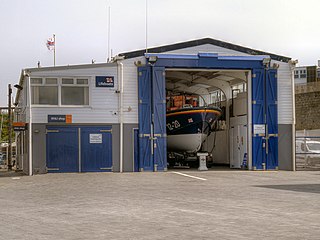
Margate Lifeboat Station is a Royal National Lifeboat Institution (RNLI) station located in Margate in the English county of Kent. The station is over 160 years old. Its crews have earned a number of gallantry awards, including five silver and 1 bronze RNLI medals for bravery.

Shoreham Harbour Lifeboat Station is a Royal National Lifeboat Institution (RNLI) station located in the town of Shoreham-by-Sea in the English county of West Sussex.

Happisburgh Lifeboat Station is a Royal National Lifeboat Institution (RNLI) Inshore lifeboat station close to the village of Happisburgh in the English county of Norfolk in the United Kingdom. Since 2003 the station boathouse has been re-located from the village to an area south called Cart Gap. This is because the beach below Happisburgh disappeared due to coastal erosion and the stations slipway and access was washed away. The original boathouse in the village is now used for training.

Eyemouth Lifeboat Station is located at the harbour town of Eyemouth, in the Scottish Borders, Scotland.

New Quay Lifeboat Station is located off Glanmor Terrace, in the seaside town of New Quay, Ceredigion, West Wales.

Filey Lifeboat Station is a Royal National Lifeboat Institution (RNLI) lifeboat station located in the town of Filey, North Yorkshire, England. It is one of eight operational RNLI lifeboat stations situated on the Yorkshire Coast.

Clacton-on-Sea Lifeboat Station is located on Hastings Avenue, in the seaside town of Clacton-on-Sea, on the Tendring peninsular, in the county of Essex.

Wicklow Lifeboat Station is located at East Pier in the county town of Wicklow, County Wicklow, a harbour town at the mouth of the River Vartry, on the east coast of Ireland.



